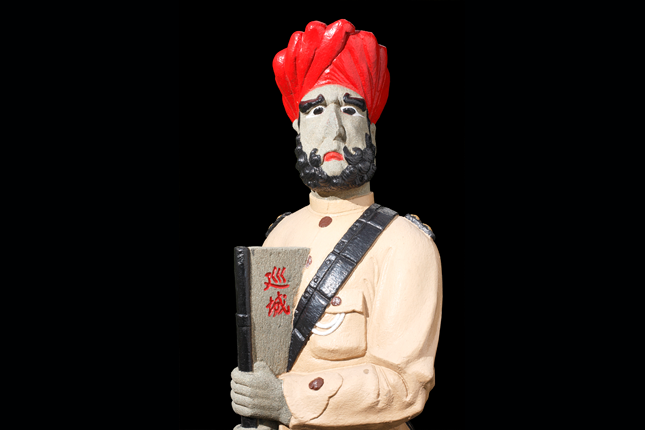22 CHEW GEOK LEONG 周玉龍
The “Live” Tomb
CHEW GEOK LEONG 周玉龙 (1870–1940) Place of Ancestry: Ann Kway (安溪)
Chew Geok Leong’s tomb is one of the most iconic and recognisable in Bukit Brown.The Sikh guards are the only painted pair in the cemetery.
Chew was a former Qing official who came to Singapore at the turn of the century. He fled China as he did not want to align himself with the warlord Yuan Shih Kai who was at that time consolidating his power to overthrow the Emperor. He came to Singapore with his family and established a Chinese medical practice and shop at 925 Geylang Road.
His youngest daughter, Madam Chew Chwee Eng remembers her father telling her with pride they came from a family with four generations of Chinese physicians. He was still alive when he started preparing for his death. This in Chinese traditional practice is called a “live” tomb, encouraged, because it leaves descendants very clear as to how to handle funeral arrangements, often a source of conflict in families., Chew ordered his own coffin – which was stored in the servants quarters – and ordered the pair of Sikh Guards from China. The Sikh guards became his loyal sentries when he died, guarding him and his legacy. Their rank is ‘Naik’ – equivalent to Corporal, as seen by the two chevron arrows. The statues have been assigned names reflecting their duties – Home Guard (守府) – “patrolling the home” and City Guard (巡城) – “patrolling the city”.
By choosing a pair of Sikh guards to protect his grave, Chew implicitly recognised their reputation for bravery and loyalty. The Sikh guards were brought over by the British for defence and security. When they retire, they went on to guard banks, businesses and even served as body guards.
Another interesting inscription from Chew Geok Leong’s tomb is his involvement in the Opium Movement or rather transliterating it correctly the Anti-Opium Movement. In the past, some of traditional medicines contain opium, but realising how opium addiction was growing among the community, many Chinese pioneers including Chew Geok Leong pivoted against the use of it.
by Peter Pak


Recent Comments